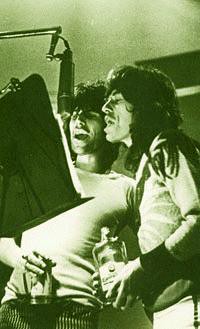Respecting The Darvocets...
The family attended the Taiwanese Hemp Farmer’s thirty something birthday party cookout this weekend over at his place and fun was had by all. I always think back to when I was Katie’s age when my folks would attend these functions with all five of us in tow and how much fun it was to hang out with a ton of other kids relatively unsupervised while our parents, never too far away, drank beer and talked about adult things. This meant we got to stay up way past our bed time. In the immortal words of Hue B. Mooksuki and Whitney Houston, “Oh hells yeah!”
During the latter part of the evening, the discussion drifted towards a favorite topic mashed out regularly on my blog and blogroll fairly frequently: the ethics of downloading and digital music. This ended up being an inspiring, if not spirited two front debate, certainly one worth having in my mind. I’ve noticed the last couple of get togethers, a couple of the fellows I golf and pal around with have been bating me on the subject by bragging about their music thievery. When the subject came up Saturday evening, it was time to talk about it.
The discussion started with perhaps the single worst justification I have ever heard for illegally downloading music: ”I’ve been buying albums and CD’s for years that only have one good song on them and the music industry owes me. I’ll download until I feel fully compensated…”, or something to this effect. The reparations excuse. There were many other equally sorry excuses that we’re all familiar with also but that one was a new one in my book. A couple of things are worthy of note before we dive in: First, with the exception of the owner of the above excuse(s), I was greatly relieved to discover that most everybody else agreed that pier to pier downloading of music without paying for it was wrong and they don’t do it personally, and neither do they allow their kids to do it. The other thing would not surprise anyone, and that is that those who freely admit to stealing music can very much afford to either pay for individual downloads or subscribe to Rhapsody, Yahoo Music, etc… and have access to virtually limitless catalogs of music for a paltry $12.00 per month. There’s really not much more I, or anybody else can add that hasn’t been discussed already on this blog and many others other than to say that I’d rather not hear about anyone’s escapades related to their music thievery and by now you know what my position is on the subject and how serious of a thing it is for me. If you have something to add to the discussion I’m cool with it and would love to talk, but excuses will fall on deaf ears.
The other front of the discussion I had was much more promising and educational. Hemp Farmer’s wife had many questions and posits that in retrospect revealed for me what many folks find mysterious and confounding about the musicians side of this debate.
I started by running down the position from the artists perspective by paraphrasing and quoting my esteemed colleague and friend Chrispy who I think stated it best in his previous comments on the subject (reprinted with his tacit permission):
"Flea's (read: artists) essential point was that he wants you to hear the music the way it was intended. This is completely legitimate, and I'm tired of people forgetting that, for the vast majority of musicians (and recording engineers) this career is not about money. It's about creating. Unfortunately, a lot of people have no understanding of this because they aren't creative, they are pure consumers. Now they can add nothing and take everything."
And this:
"Consumers are so caught up in having it "their way" that they've forgotten that they have no "right" to this music and no "right" to receive it the way they want. Until not long ago, the only music you could hear was performed live. If you couldn't play or go see someone play, tough. We've become so spoiled, so lazy, so quickly, that we forget that, for some of us, music (and sound) are sacred. It's not just another commodity or way to get rich. It's of an importance far deeper than someone like Bob can comprehend."
While counted amongst those who steadfastly reject stealing music off the internet, Hemp Farmer’s wife was miffed and remained unconvinced of the sincerity of recording artists and musicians seemingly anti capitalist position as did others participating in the discussion.
I used The Darvocets as a prime example of artists who exercise their right to control the method in which their music is listened to. For those unfamiliar with The Davocets, they recorded and pressed only vinyl copies of their latest release “Authentic Music From Another Planet". They could have easily pressed many more copies of this album to CD and thus perhaps made significantly more money than a vinyl only run. “But that’s silly, don’t they want more people to hear their music and buy their art?” A good question. The answer is yes, they would like people to hear their music, but what they want more is for people to listen to it the way in which THEY intended and are more than willing to forego the additional revenue they'd otherwise receive using a different medium. “That’s nuts!” was the reply I got, “it’s always about money…”.
Like Chrispy states, she cannot grasp that it’s not about the money for most in the business of music. If it was, nobody would be doing it since less than a sliver playing music for a living actually make anything close to “Rock Star” bucks. It was on this point that while replaying the discussion in my mind later that night and the next day it dawned on me why Hemp Farmer’s wife and many others can’t grasp the pain artists and musicians feel on this subject: Most folks, casual listeners of music, don’t KNOW or otherwise hangout with any musicians/artists and this is certainly the case here. Most in our little group are tech professionals, graduates of tech schools, and/or work in finance, law etc… They’re musical tastes are fairly mainstream and their listening habits are best described as casual. They’re exposure to the creative population of the world has been somewhat limited. I think this is why many have little grasp of how deeply devoted most artists are to their work. I remain convinced that if they got to know more artists, they’d understand better that the world of music goes far beyond the pimps, hoes, and posers of the pop music world who create music for the sole purpose of making money. With the exception of one other guy, I am the only “musician” in the bunch (a bad one at that) and we rarely talk about music when in company with this group of friends.
Perhaps an analogy would help make it clearer for them. Most in our group would have mad props and respect for a guy who, instead of going on to a civilian life and career, chose to play 20 years of minor league baseball knowing that he’d have zero chance of making it to the big show. Simply put, someone who is playing the game for his love of it. There are many ball players doing just that and they certainly get my utmost respect not to mention the countless thousands of kids not on scholarship playing sports at colleges not contending for national championships and TV exposure.
For as many in the pop music industry who make compromises to sell more copies of their records, there are legions of musicians and artists who would rather die than do that. Mike Doughty mentions how embarrassed and stupid Yani Lane of Warrant feels about his career in a recent post. Mike points out in VH1’s documentary “Heavy” to a snipet where Yani’s “talking about how he wrote "Cherry Pie" in one night, because his record company demanded a single; he hates it, spoke bitterly of promotional pie-eating contests and how the wretched tune would be his legacy, and actually wept on camera.” Yani made a poor career decision that he gets little sympathy from anyone on. However, on another level I can completely understand his emotional outburst at having compromised himself so much as a musician/artist and with that I genuinely feel bad for him.
Most make music for themselves and the pure pleasure of doing it. They would welcome the idea of their art taking off and making them a fortune and most can also grasp the fact that more than likely it won’t. Still, they dedicate their lives to it regardless of the life long financial challenges this reality presents. Most would just be satisfied to simply make a living of it and not have to work a day job.
There is nothing at all wrong with being a casual listener or fan of pop music. At the same time, I think it’s important to respect the artists right to own their art. At a minimum, respect them enough not to steal it, but also to respect their right to expose you to it (or not) in the way that they determine even if it’s to their financial detriment. Also understand that artists in turn respect the consumer’s right to not buy their art.
Ultimately, I’m glad we had the discussion Saturday night and hope nobody was put off by it in anyway. It was not an attempt to seize higher moral ground on my part. While I don’t make my living playing or recording music, it is nevertheless a HUGE part of who I am. For nothing else, a bunch of people now know what I’m most passionate about (other than my wife and my kid). There are many other aspiring artists and artist wannabe’s like me out there. Take the time to get to know them. You’ll be glad you did. If you do, I am certain you will discover a commitment, dedication, and passion you have never seen before, and you’ll find them just as worthy of respect as the guy slogging out a career in minor league ball for nothing other than the love of the game.






12 Comments:
Nice post - great analogy - minor league baseball et al.
I wish I'd been there.
I guess, in a way, I was.
I could have used an ally my friend. To be sure, no harm was done and I hope if anything I helped educate more than anything else.
Can't wait to see the Plimsouls with you!
Saturday provided for a healthy debate. It is always good to have passion and be passionate. For the record, I have never stolen music and I don't condone it.
As sure as I obviously missed your point, the reverse may also be true. I want to listen to music that speaks to me. If an artist creates without appealing to those whom they want to ultimately benefit from it and appreciate it, it will fall on deaf ears. People don't hear it as it is intended. They hear it as it relates to their own situation. That being said, if you want people to listen to your music, and if you want people to buy your music, you have to have people in mind when you create the music. Otherwise the only way people will have it is if you give it away...and here we are back to free music again.
Your perspective is that of the seller, mine is of the buyer. The two will likely never meet, but we can keep trying. :)
Always appreciative of a good debate.
Hemp Farmer's Wife
Stealing music isn't cool for sure
But artists lose control of their music the minute the sign a record deal
What I amm waiting for is the day that artists truly control the distribution of their music and then maybe we'll see it become much easier to find and listen to and share (which is a huge part of being a fan)
The day an artists considers anyone other than his or herself when creating music is the day he/she is no longer an artist.
You CANNOT consider your audience - ever! To do so is death.
Nobody who ever made a great record ever sat down and said, 'Hmmmm, what do the kids want?'
An artist creates for himself, and hopes it sells, hopes it connects, and I firmly believe that it will only connect with the audience if it has truth for the artist.
For once, on this blog, I completely agree with what you said, Jackson! I don't know much about the music industry, but I think you are right.
i think you are right Jackson, but i also think artists must let go of their work when its done and let the audience take over.
it's like they shouldn't think about the audience at all, not when they are making the art and not when they have released it.
Jackson,
Most excellent point, and so many recent posts about artists that are apropos to this discussion abound lately. Peter Case in the post below this one saw what the record company was going to do with him and his Plimsouls and knew that he had to make a move. Although he loves the music the Plimsouls create, he also knew he had much more to offer than just what the Plimsouls were about. He left a much more lucrative situation for one that was much less so in order to create what HE wanted to create.
Your post regarding Neil Young. I don’t think Neil Young EVER made a record in the interest of pleasing anybody but himself, and never made a concession in the interest of making a song or record more marketable. Some of his efforts are better than others, but when they’re good they’re fantastic.
Farmer’s Wife,
Consider this… Do you think when Kurt Cobain went into the studio with his band to cut In Utero he was thinking about how to please his fans or make money selling what would become the record? It’s an easy answer, no. Again, while there are many folks out there that make music to please the masses and make these concessions, there are many, like the case of Nirvana who are just as popular from a unit sales perspective that make no compromises for anybody. IMHO, these are the acts that are worth listening to and have integrity. For them it’s NOT about the money. The money comes as a byproduct of making uncompromised thought provoking art. Longevity and influence usually follow as well. Nirvana certainly left an indelible mark on music that will be talked about for decades, if not a millennium. Now that’s a personal taste thing, but I do believe that all artists, whether they make music for themselves or for the masses rightfully own it (unless they’ve sold that right) and should be free to market it (or not) how they see fit and nobody should dictate how that should be, not record labels, technologists, or fans. It’s not their music.
Having said that, I still find much of the quote “compromised” music enjoyable too. I’m a big fan of pop music and know a little about how it’s crafted. In it’s own way, it’s art too.
RBAY,
True, some artists lose control of their art when they sign a contract, and then again some don’t. I have no empirical evidence to offer you, but I sense the tide turning in this dimension. Yes, Taylor Hicks will be a slave to the American Idol label and get exactly zero say in anything he does, but many other bands now have leverage since technology provides them other choices. As the world you describe emerges (and I too live for the day that it happens), contracts and publishing deals will become far more equitable for artist and artistic freedom will reign.
“…Let the audience take over” right now equates to stealing music unfortunately. As I noted in the post, in most scenarios an artists work as often all they have. I may be alone or standing with the chanting hordes here, but as a student and failed painter myself, I think artists have always cared deeply about what happened to their work after it was completed since exploitation has been par for the course. I may be wrong, but I don’t think you’ll ever see a recording artist create his work an throw it into the wind. They may not want to see a balance sheet, but they’ll want to know how it’s being presented and used.
As for the technologists, (I may be stealing this thought from you), I think them, the VC’s, and any other non-creative entity associated with the future of digital music should start asking the artists what they want for once. I think if they continue to ignore them you’ll find that, like Chrispy, they will reverse their thought and saddle up next to record companies and demand more intrusive DRM and copy protection. There’s a lot of mistrust between the creative and capitalist worlds for good reason. A backlash will hurt the money folks worse than the artists. The artists already know how to live on nothing.
"the artists already know how to live on nothing'
Perfect.
As for Neil, it's Elliott Roberts job to sell Neil, it's Neils job to be Neil. I just finished his bio, and he did make one record with the audience in mind - 'Harvest Moon' was very much designed to be commercial and sell, and it did. But Neil can do that and retain integritry because of "Landing on Water' and 'Everybody's Rockin'. Because he put out albums he knew would not sell, albums he wanted to make anyway, gives him credibility in the eyes of the public after the fact. Most folks were lambasting him in the eighties for making crap, but now we love him for it.
People - we're funny like that.
As for RBTY's point about giving it up once it's finished, I agree that the artist must accept that certain things will happen to his songs that he won't be able to control - but he doesn't have to like it.
Now we're back to Flea. He spoke his mind, what of it? Why was there so much backlash? I'll tell you why, because the guilty know they are guilty. They are upset because he called them out, and deep down, they know they are wrong and he is right.
Does Flea have recourse? Not much, without completely coming off as a money grubbing miser.
So where are we?
If it feels wrong, it is wrong.
Artists make art, mangers/labels sell art, consumers buy art. Decide who you are and act accordingly.
Do we really want a world where it's up to the artist to sell his work? Artists are notoriously bad business people.
If you want to fuck with the model, be ready to end up with something less that what you are used to.
On the nail again Jackson.
We've talked about this before to some extent, but it bares repeating. Having the ability to create and operate one's own label (i.e. marketing and distribution) does NOT automatically mean that every artist will become successful label mogels in their own right. I think most artists recognize and respect these non-artistic disciplines as necessary and essential support functions in need of subcontracting (i.e. just because Kurt wrote "Heart Shaped Box" doesn't mean he could have put together a cool website to sell his music). I think there will always be a need for partnerships on the business end of music. I do think that the technology will allow artists to hire and fire these people much easier that they can now.
I respect that everyone has contributed very valid arguments, especially those contrary to my own. However, consider any of the musicians that were used as examples in previous postings as having not compromised. If you think they didn't have people in the background spinning things to their advantage (PR, marketing, fashion, and yes, even music production) for publicity's sake, and thus to sell records, you are sadly mistaken.
It's similar to the point tony made about needing the partnership on the business end. Unfortunately, the difference is the artist needs the label for production, distribution, publicity, etc. more than the label needs the artist. I mean, seriously, we've all seen the product of pop music...and it's quite disgraceful. They can make anyone an overnight success with no regard for talent. Sad, yes, but true.
I'm not advocating selling out, but it seems there should be some middle ground somewhere. Certainly the industry needs to reinvent itself, but the inflexibility on the part of all parties involved (artist, label, and consumer) puts us at an impasse.
HF's wife
Excellent, love it! Effects lipitor side strong Drug fluoxetine interaction photos nude teenage pregnant msn messenger vedio conferencing statins multipel sclerosis
Post a Comment
<< Home